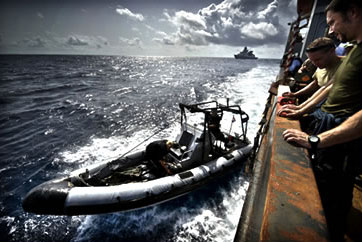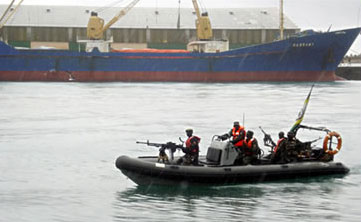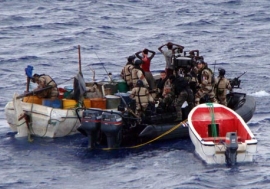Tackling piracy off African shores
Tackling piracy off African shores
 A relief ship delivering food to Somalia is protected by a Dutch warship (in the background) to ward off potential pirate attacks.
A relief ship delivering food to Somalia is protected by a Dutch warship (in the background) to ward off potential pirate attacks.Persistent and high-profile acts of piracy off the coast of Somalia prompted no less than four meetings of the UN Security Council in the second half of 2008. The goal, pushed by major powers, was to begin reining in the growing threat to commercial activity in one of the world’s most important shipping lanes. In its December meeting, the council authorized governments that are already carrying out naval operations in Somali waters to possibly extend their anti-piracy efforts to land and air. But UN Secretary-General Ban Ki-moon stressed that Somalia’s piracy problem cannot be divorced from the need to forge a comprehensive peace agreement for the country. As Dumisani Kumalo, South Africa’s UN representative, told an October council meeting, piracy in Somalia is “part of the larger problem of the lack of peace and stability.”
Piracy, moreover, is not limited to Somali waters. Weak coastal states located near shipping choke points (where traffic is slow) are the most likely havens for piracy, says Kerstin Petretto, a researcher at the German Institute for International and Security Affairs. That description fits the waters off Somalia and a few other parts of the world, including West Africa’s Gulf of Guinea, which saw 40 pirate attacks from January to November 2008.
But piracy off Somalia is more common. Since the International Maritime Organization (IMO) began keeping records in 1984, there have been more than 440 reported acts of piracy off the Somali coast. “Of these, 120 took place in 2008 alone,” IMO Secretary-General Efthimios Mitropoulos told the Security Council in November. More than 40 ships and 600 seafarers have been seized. Pirates have collected an estimated $120 mn in ransom.
Farther and more brazen
Somali pirates are also sailing increasingly farther into the Indian Ocean from their bases in Puntland, in northern Somalia. One vessel, the Sirius Star, a supertanker carrying two million barrels of oil, was hijacked 450 nautical miles (833 kilometres) southeast of Kenya’s port, Mombasa, farther south than any previous attack. “This incident is significant on two counts,” says International Maritime Bureau (IMB) Director Pottengal Mukundan. “Firstly, this is the largest vessel to have been hijacked. Secondly, the distance from the shore would suggest a highly organized operation — this is not mere opportunism.” The IMB is a division of the International Chamber of Commerce and operates a 24-hour piracy reporting centre.
Rising pirate attacks led to a 12–15 per cent rise in insurance premiums in 2008 and a hike from $500 to $20,000 of the special risk insurance for each ship passing through the Gulf of Aden, which skirts Somali waters. Ships can go around South Africa’s Cape of Good Hope to Europe instead. But the Gulf of Aden route, which serves about 20,000 vessels annually and carries over 12 per cent of all the oil transported by sea, is faster and cheaper. Nor is the Cape route totally safe. The Sirius Star was using the Cape route when it was hijacked.
‘A perfect environment’
With very little functioning government, long, isolated beaches and a population that is desperate and accustomed to war, “Somalia is a perfect environment for piracy to thrive,” states an October 2008 report by Chatham House, a UK-based think tank.
Within Puntland, the autonomous area in Somalia where most pirate attacks originate, the hijackings are seen as an important source of income, providing jobs and opportunities for hundreds. Fuel suppliers and merchants equip the pirates’ boats.
 African Union forces escort a cargo ship released by Somali pirates.
African Union forces escort a cargo ship released by Somali pirates.Many pirates started as fishermen. As Ms. Petretto points out, Somalia’s fishing waters used to be a source of community income. But over time they attracted many European and Asian fishing vessels, whose exploitation depleted fish stocks and possibly prompted residents’ “sense of justification in targeting foreign ships.”
Successful anti-piracy efforts do exist. Until 2004, the Malacca Straits, a narrow passage through the waters of Malaysia, Indonesia and Singapore, was the world’s most pirate-prone region, with 103 attacks that year. The three countries mounted daily joint air and sea patrols, eventually reducing the attacks to just 32 between January and September 2008.
Following a June Security Council authorization for naval powers to conduct similar patrols off Somalia, warships from more than a dozen nations, including NATO and European Union members as well as Russia and India, have taken turns policing the waters. Consequently, successful hijackings fell from 53 per cent of total attacks to 31 per cent between August and October. But the area is too vast — an estimated 6.5 mn square kilometres — to police effectively.
Limited capabilities
African countries themselves lack the resources to contribute to such an effort. They do not “have the money for fuel, never mind the hardware, to run adequate surveillance at sea or port security,” argues Chris Trelawny, IMO’s chief of maritime security.
To be effective against piracy, Africa’s coastal countries would need “effective early warning and intelligence services, credible deterrent and reaction forces … high mobility … and the ability to sustain operations for long periods,” says Len le Roux of the South African Institute of Security Studies. Those are precisely the capabilities “sorely lacking in Africa.”
Oil-rich Nigeria, in whose waters most piracy in West Africa occurs, has the best navy in the region. But in 2005 its former commander told the local media that “in its present state” it could not protect the nation’s territorial waters because it was “ill equipped and underfunded.” The waters off Cameroon and Angola are also prone to piracy, but their navies are even less equipped.
South Africa is in a stronger position, and its air force patrols the coast daily. But air patrols can easily miss a ship or the speedboats favoured by pirates. And South Africa does not have a satellite-based security system, which could monitor ships passing within 1,500 km of the coast.
Worse, says Mr. le Roux, regional solutions are lacking. He notes that the African Union’s arrangements to establish standby peacekeeping forces do not address maritime threats. Those plans, he says, leave “the impression of an Africa without a coastline or maritime zone, let alone broader maritime interests such as trade and resources.”
Regional approach
International cooperation is helping West African countries better handle maritime security. The US and European countries are working with local navies to enhance their capacities and engage in joint policing of territorial waters. Such partnerships are partly driven by the area’s strategic interest as an oil-exporting region, as well as concern over the recent use of West African waters by traffickers of cocaine and immigrants to Europe.
But naval training, better equipment and law enforcement will not be enough, says a 2005 report by the UN Office on Drugs and Crime (UNODC). It argues that strengthening the “legitimacy of governments,” “tackling corruption” and addressing endemic poverty will be vital in denying criminals an environment favourable to illegal activities. In Somalia, the Chatham House report notes, although piracy has been a problem since the collapse of government in 1991, it almost vanished during the six-month rule of the Islamic Courts Union in 2006. “This indicates that a functioning government in Somalia is capable of controlling piracy,” the report argues.
UNODC presented a number of concrete proposals to a December 2008 UN-sponsored meeting in Nairobi on tackling piracy. At the meeting, 40 countries agreed to trace, track and freeze assets of those who back Somali pirates. “Regional cooperation is essential,” UNODC Executive Director Antonio Maria Costa said in mid-December.
As well as going after financial flows, the proposed measures call for countries in the region to cooperate in placing law-enforcement officials aboard warships operating in Somali waters and to bring captured pirates to justice in local courts, a system that has been successful in the Caribbean. December’s Security Council resolution called on Somalia’s neighbours to establish such a network of “ship riders,” as the officials are known, and to set up a contact group for gathering intelligence on pirates.
Nevertheless, African speakers at the December Security Council meeting strongly argued that action to tackle piracy must not be taken at the cost of resolving Somalia’s broader peace, security and humanitarian challenges.














